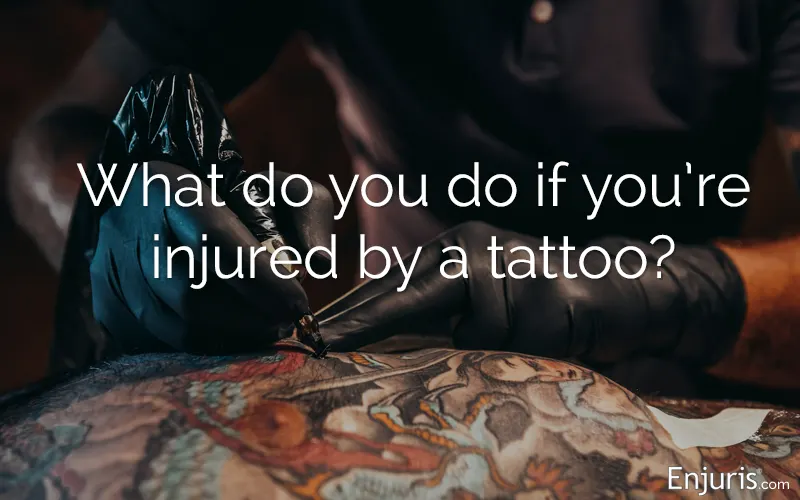
Getting “inked” is a rite of passage for some people. It might be artistic expression for others. Some get tattoos to honor or memorialize a loved one. And others just like it.
But getting a tattoo involves some risk. The process involves piercing the skin with needles to insert the ink, which could present some dangers. If something does go wrong, what is your recourse?
Rather, can you sue a tattoo artist?
Risks associated with tattoos
- Infection: Improper sterilization of equipment or unhygienic practices can lead to bacterial, viral, or fungal infections at the tattoo site. These infections can cause pain, swelling, redness, and may require medical treatment, including antibiotics.
- Allergic reactions: Some people are allergic to tattoo ink or the materials used during the tattooing process. This can result in itching, redness, swelling, or more severe reactions such as anaphylaxis in rare cases.
- Skin irritation: Even without an allergic reaction, the tattooing process can irritate the skin, causing temporary discomfort, redness, or itching.
- Scarring: Poor technique or improper aftercare can lead to scarring at the tattoo site. Over time, the appearance of the tattoo could also change due to aging, weight fluctuations, or sun exposure.
- Bloodborne diseases: If the tattoo equipment is not properly sterilized or if needles are reused without proper sanitation, there is a risk of transmitting bloodborne diseases such as hepatitis B, hepatitis C, or HIV.
- Regret and removal issues: Some individuals may later regret getting a tattoo, leading to psychological distress. Tattoo removal procedures, while available, can be expensive and time-consuming and might not completely erase the tattoo or its visibility.
- MRI complications: Certain tattoo inks contain metallic elements that can interfere with magnetic resonance imaging (MRI) scans, leading to potential complications during medical procedures.
Are tattoo artists licensed?
In most states, tattoo artists are required to be licensed.
According to the American Red Cross, there are nine jurisdictions that don’t regulate tattoo facilities: District of Columbia, Georgia, Idaho, Maryland, Massachusetts, New Hampshire, New York, Pennsylvania, Utah and Wyoming.
Licensing requirements vary by location, but they typically include completing a formal training program in tattooing, obtaining certification in bloodborne pathogens training and infection control, and meeting health and safety standards set by local health departments or regulatory bodies.
Additionally, many jurisdictions require tattoo artists to pass exams or demonstrate proficiency in areas such as hygiene practices, sterilization techniques, and proper handling of tattoo equipment. Some regions also have age restrictions for obtaining a tattoo license. It's essential for tattoo artists to comply with these regulations not only to ensure their own professional credibility but also to protect the health and safety of their clients.
Can you sue a tattoo artist?
Yes, there are certain circumstances when you could sue your tattoo artist. The most likely conditions under which a tattoo artist could be subject to a lawsuit include:
- Negligence: If the artist's actions or lack of care led to an injury or harm, such as using contaminated equipment or applying the tattoo incorrectly.
- Breach of contract: If the artist did not fulfill their promises or obligations as outlined in a contract or agreement, such as not completing the tattoo as requested or using inferior materials.
- Copyright infringement: If the artist reproduced copyrighted artwork without permission or used designs that were not their own without proper authorization.
- Fraud or misrepresentation: If the artist made false claims about their skills or experience, or if they misrepresented the safety or quality of their services.
What are a tattoo artist’s defenses to a lawsuit?
The customer signed a waiver that disclaims liability
A consent or release form that the customer signed might release the artist from legal responsibility. It acts similarly to a medical consent form (that you likely sign every time you seek medical treatment, or that your physician has on file).
No legal form can shield someone from liability altogether. It certainly won’t protect the defendant if they were negligent. The waiver does not protect a tattoo artist from liability if they spread a blood-borne disease through reused needles or unsanitary practices, but it might protect them from lawsuits for typical or common issues like skin infections.
However, the court might enforce a tattoo waiver if:
- It clearly specifies the known risks of the procedure and the type of procedure, itself;
- The client isn’t pressured to sign the waiver; and
- The client is over 18 years old and legally competent at the time when the waiver was signed.
Assumption of risk
Typically, an assumption of risk defense is used when the plaintiff has engaged in an abnormally dangerous activity (think bungee jumping or skydiving). But it could apply if the defense can show that the plaintiff knew the risks associated with getting a tattoo and chose to get one, anyway. This would depend on the nature of the injury and the specifics of the claim.
Breach of contract
Most tattoo artists and clients will sign a contract before the procedure is performed. The client might be able to file a lawsuit if the artist doesn’t meet the terms of the contract.
Does the client have recourse against a tattoo artist?
There might be ways to recover damages from a tattoo artist without filing a lawsuit. A lawsuit is a last resort—it will be time-consuming and costly for all parties involved. A personal injury lawsuit allows a plaintiff to recover damages from the defendant’s neglience that covers costs for medical treatment, lost wages, and other economic losses. In this instance, you might only be entitled to the cost of fixing or removing the tattoo, depending on the type of injury.
It might be worth approaching the artist or shop owner first to see if they’re willing to negotiate before filing a lawsuit. They might be motivated to avoid a lawsuit and will rectify the situation if possible.
Preventing a lawsuit against a tattoo artist
You can never assume that there’s no potential for a lawsuit. But if you carefully follow these steps when getting a tattoo, you can make it more likely that you’ll be satisfied with the result and leave less room for injury.
- Select a design: The first step is choosing a design for your tattoo. You can either bring your own design or work with the tattoo artist to create a custom design based on your ideas.
- Consult with the tattoo artist: Discuss the design, placement on your body, size, color options, and any other details relevant to the tattoo.
- Prepare: On the day of the tattoo appointment, the tattoo artist will prepare the work area by sterilizing surfaces and gathering the necessary equipment. They may also prepare a stencil of the design to use as a guide.
- Apply the stencil: The artist will apply a stencil of the design to your skin, allowing you to see how the tattoo will look before it's permanently inked. You'll have the opportunity to review and make any final adjustments at this stage.
- Tattooing: Once the stencil is in place and you're satisfied with the design, the tattooing process begins. The artist will use a tattoo machine with needles to inject ink into the skin, creating the desired design. The process can be uncomfortable or painful, depending on your pain tolerance and the location of the tattoo.
- Aftercare: After the tattoo is complete, the artist will provide instructions for proper aftercare. This typically includes keeping the tattoo clean, applying ointment or moisturizer as recommended, avoiding exposure to sunlight and water (such as swimming) for a specified period, and avoiding picking or scratching at the tattooed area.
- Follow-up: Depending on the complexity of the tattoo and your skin's healing process, you may need to schedule a follow-up appointment for any necessary touch-ups or adjustments.
A tattoo is a big decision, but so is a lawsuit. If you’re considering a tattoo, make sure to ask if the artist’s licensing is up to date (if you’re in a state that requires it) and that they’ve received appropriate training in bloodborne pathogens and sanitizing procedures.
Recent lawsuits for injuries from nail and hair salon services
Nail salons can be a refuge if you’re in need of pampering, but they can also be the source of dangerous infections. Recent lawsuits highlight salon injuries.

